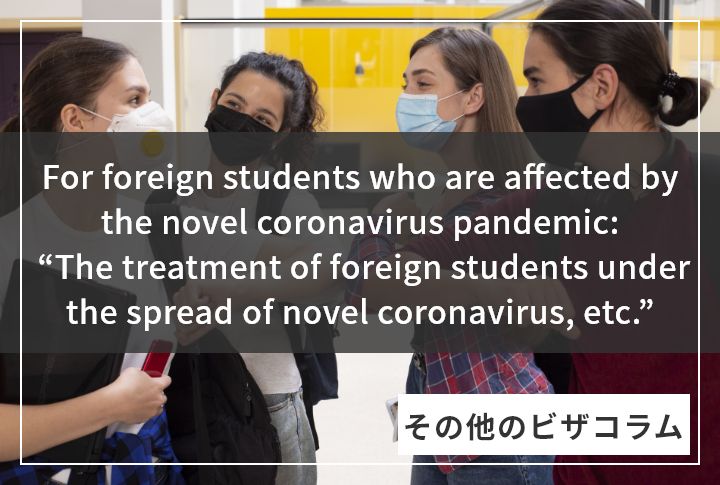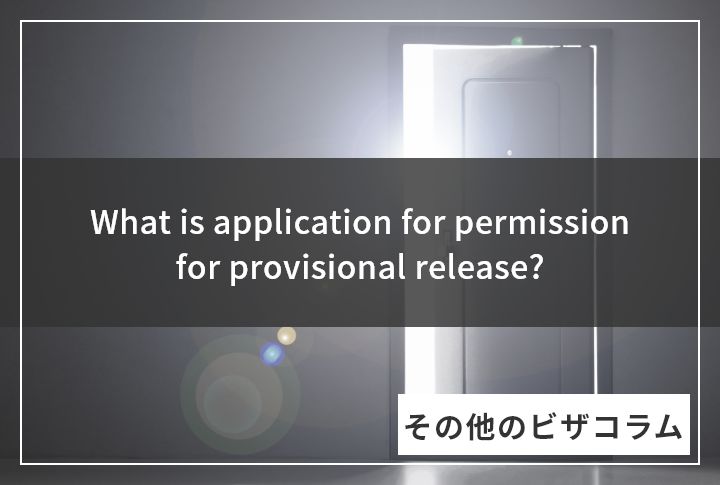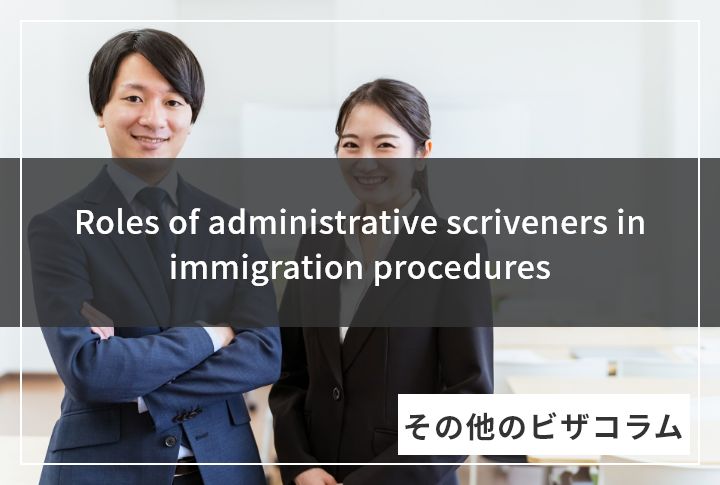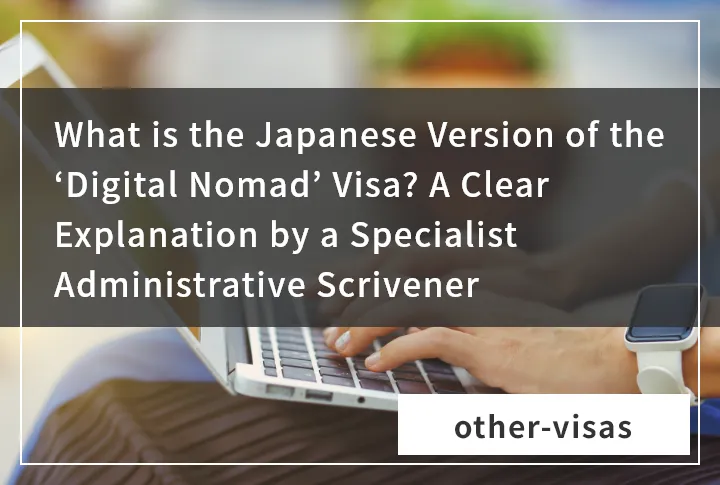【Case Study】Designated activities visa for medical stay

Ms. A, a Vietnamese female, has lived in Japan for 20 years and has already obtained a permanent resident visa. Ms. A’s parents live in Vietnam, but a few years ago her father developed lung cancer and her mother has been taking care of him. Ms. A wants her father to receive the most advanced cancer treatment in Japan as such treatment cannot be received in Vietnam. If possible, Ms. A wants her mother to come to Japan along with him to take care of him together. How can Ms. A’s parents come to Japan?
Like Ms. A’s parents, there are not few foreigners who wish to receive medical treatment in Japan. In this article, we will introduce designated activities visas to stay for medical purposes.
Index
1. The public notice on designated activities for medical stay
Under Japanese immigration system, only those foreigners who fall under any of the statuses of residence stipulated by law are permitted to stay in Japan. Nevertheless, it is not practical and actually impossible to categorize all foreigners who should be allowed to stay in Japan. Therefore, the Immigration Act provides a status of residence called “Designated Activities” to provide individual relief in light of the circumstances of individual foreigners.
The activities of the status of residence of designated activities are stipulated as “activities which are specifically designated by the Minister of Justice for individual foreign nationals.” As you can see from this provision of the Immigration Act, the Minister of Justice is entrusted to designate the activities. In response to this, the Minister of Justice has designated some activities for the designated activities visa in the form of a public notice (the Public Notice on Designated Activities)).
The designated activities visa for a medical stay is listed in the Public Notice on Designated Activities as follows:
(Reference) Public Notice on Designated Activities No. 25
“Activities to receive medical treatment for illness or injury during hospitalization at a hospital or clinic and activities to continuously receive medical treatment for such illness or injury before and after such hospitalization, while staying in Japan for a considerable period of time.”
In the next section, let’s look at the requirements for a designated activities visa for a medical stay.
2. Requirements for a designated activities visa for a medical stay
There are roughly 4 requirements for designated activities visas for a medical stay.
(1) Activities in Japan must be “activities to receive medical treatment for illness or injury during hospitalization at a hospital or clinic” or “activities to continuously receive medical treatment for such illness or injury before and after such hospitalization.”
Since the activities are the receipt of treatment during the hospitalization in a hospital or clinic, a designated activities visa is not granted if the applicant stays at a hotel or friend’s house.
Having said that, constant visit to a hospital is permitted as a part of activities if the patient had been hospitalized for a considerable amount of time and is going to hospital for continuous medical treatment. The “activities to continuously receive medical treatment” means that a series of medical care is provided before, during, and after hospitalization constantly and continuously. For example, if a person who had been hospitalized before for anticancer treatment visits the hospital for follow-up observations, there is continuity of medical treatment. If the same person goes to the hospital as he/she was injured in an accident which has nothing to do with the cancer treatment, the continuity of medical care will be denied.
Moreover, “illness or injury” includes childbirth. Accordingly, when a foreigner is giving birth in Japan, a designated activities visa for a medical stay can be an option (if other status of residence are not available).
(2) “Staying in Japan for a considerable period of time”
The meaning of “a considerable period of time” is any period exceeding 90 days. The length of such period for treatment in Japan is decided in advance, judging from doctor’s medical certificates.
If treatment is to be completed within 90 days, the status of residence of “Temporary Visitor” will apply.
(3) To have the ability to pay costs for staying in Japan and for medical treatment
Foreigners staying on a designated activities visa for a medical stay cannot subscribe the National Health Insurance. This is because the designated activities visa for a medical stay is intended for temporary stay in Japan for medical purposes and is not designed for continuous living in Japan. The premise of Japanese medical insurance system is that public medical insurance for foreigners should be covered by their countries.
Such foreigners who cannot subscribe the National Health Insurance will have to bear all medical expenses. Not only medical expenses, but they must have ability to pay all expenses incurred during their stay in Japan, including accommodation expenses after leaving the hospital. In this regard, even in case that foreigners do not have any savings, their relatives’ ability to pay accommodation expenses, etc. can be counted as the foreigner’s payment ability, if their relatives are willing to pay. In general, foreigners who come to Japan for a medical stay subscribe private medical insurance.
3. Designated activities for a person accompanying during a medical stay
The Public Notice on Designated Activities stipulates the foreigners who accompany patients, like Ms. A’s mother accompanying her husband.
(Reference) Public Notice on Designated Activities No. 26
“Activities to provide care for daily life of a foreign national engaged in designated activities listed in preceding item (excluding the business management activities involving income or activities for which he or she receives remuneration).”
“Activities to provide care for daily life” means to assist a foreign patient during his/her hospitalization, to help transportation to and from the hospital and to attend the patient before and after hospitalization, etc. Not only family members but also non-family members of patients are permitted to accompany him/her, but in case of non-family members, the relationship with the patient receiving the treatment is carefully examined in light of credibility of the activity content.
Housemaids are not eligible because accompanying a patient with a reward is not an activity permitted under the status of residence, as described in the round brackets in the public notice.
4. Documents required for a designated activities visa for a medical stay
The following documents are required to apply for a designated activities visa for a medical stay.
1) An application form (Application for Certificate of Eligibility or Application for Change of Status of Residence)
2) The certificate of acceptance issued by a Japanese hospital, etc.
3) Materials explaining the activities schedule during the stay
(a) Materials describing the hospital, etc. where the applicant will be hospitalized (pamphlets, broachers, etc.)
(b) Treatment schedule
(c) Documents clarifying where the applicant will stay before or after the hospitalization
4) Any of the following documents to certify the ability to pay all expenses necessary for the stay:
(a) The certificate of advance payment, or payment of deposits, etc. to the hospital, etc.
(b) A copy of the insurance policy of a private medical company and a copy of terms and conditions thereof (a document to prove that expenses required for medical treatment, etc. will be covered by the medical insurance, etc. which the patient has enrolled in)
(c) The certificate of deposit balance
(d) A written guarantee of payment by sponsors, supporting groups, etc.
The certificate of acceptance issued by a Japanese hospital, etc. will be required. If the foreign medical institution that treats you does not have any relationship with the Japanese medical institution where you wish to go, you can first come to Japan with a temporary visitor visa to visit the Japanese hospital, and then apply for change of status of residence.
In addition, the following documents are required to apply as an attendant.
(1) An application form (Application for Certificate of Eligibility or Application for Change of Status of Residence)
(2) Documents explaining the activity schedule during the stay (itinerary during stay, place of stay, contact information, and the relationship with the patient who will be accompanied by the applicant)
(3) Document certifying the applicant’s ability to pay all expenses during his/her stay in Japan
5. Summary of designated activities visas for a medical stay
The period of stay permitted by a designated activities visa for a medical stay is limited to the period of treatment in Japan. To continue to stay in Japan after completion of the treatment, or to stay in Japan for a purpose other than treatment, the visa mentioned in “【Case Study】Calling foreign parents to Japan (a designated activities visa for the support to elderly parents)” could be an option, but the visa is said to be difficult to be obtained.
Ms. A’s father was granted a designated activities visa for a medical stay, and her mother was granted a designated activities visa for a person accompanying during a medical stay, but her father passed away in Japan after 1 year of treatment. After that, her mother switched to a designated activities visa for the support to old parents, and currently lives with Ms. A in Japan.
Although Japan actively accepts foreign workers, legislation regarding their families is still behind. In order for Japan to stay attractive to foreigners, it is crucial to provide care for families of such foreign workers.
























